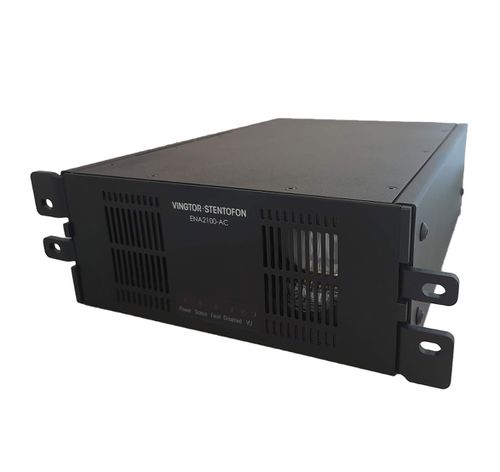Difference between revisions of "ENA2100-AC Amplifier"
From Zenitel Wiki
| Line 6: | Line 6: | ||
The amplifier has two separate loudspeaker channels. Each channel can be addressed separately, i.e. belong to two different zones, or the two channels can be combined into one channel. | The amplifier has two separate loudspeaker channels. Each channel can be addressed separately, i.e. belong to two different zones, or the two channels can be combined into one channel. | ||
| − | The amplifier monitors the speaker lines for shorts, overload and opens. A [[ELTSI-1|Line End Transponder (ELTSI)]] can be used for reliable detection of an open line. More than one ELTSI can be connected to the same line, allowing monitoring of several branches on the speaker line. The amplifier also monitors control inputs, power, temperature, network connections and every other component required for operation of essential services. Faults will be indicated locally on the | + | The amplifier monitors the speaker lines for shorts, overload and opens. A [[ELTSI-1|Line End Transponder (ELTSI)]] can be used for reliable detection of an open line. More than one ELTSI can be connected to the same line, allowing monitoring of several branches on the speaker line. The amplifier also monitors control inputs, power, temperature, network connections and every other component required for operation of essential services. Faults will be indicated locally on the amplifier and the fault relay, as well as reported to the AlphaCom server which can raise an event or forward the reports to syslog, SNMP and internal log. |
The amplifier’s control inputs/outputs and audio inputs can be used locally by the amplifier (e.g. for PTT and audio from a handheld microphone) or can be controlled by the system (e.g. audio input for background music). | The amplifier’s control inputs/outputs and audio inputs can be used locally by the amplifier (e.g. for PTT and audio from a handheld microphone) or can be controlled by the system (e.g. audio input for background music). | ||
Revision as of 15:17, 3 January 2019
The ENA2100-AC Amplifier is a 2 x 100 watt IP based amplifier that can register to the AlphaCom server over an IP network.
The ENA2100-AC amplifier operates from a 115/230 VAC supply and is designed to survive minor interruptions to the power supply.
The amplifier has two separate loudspeaker channels. Each channel can be addressed separately, i.e. belong to two different zones, or the two channels can be combined into one channel.
The amplifier monitors the speaker lines for shorts, overload and opens. A Line End Transponder (ELTSI) can be used for reliable detection of an open line. More than one ELTSI can be connected to the same line, allowing monitoring of several branches on the speaker line. The amplifier also monitors control inputs, power, temperature, network connections and every other component required for operation of essential services. Faults will be indicated locally on the amplifier and the fault relay, as well as reported to the AlphaCom server which can raise an event or forward the reports to syslog, SNMP and internal log.
The amplifier’s control inputs/outputs and audio inputs can be used locally by the amplifier (e.g. for PTT and audio from a handheld microphone) or can be controlled by the system (e.g. audio input for background music).
Contents
Installation, Mounting and Dimensions
Configuration
- Basic configuration - Getting started
- General configuration guide
- Amplifier monitoring
- Calibrating the loudspeaker lines
- Report amplifier faults to Display Station
- HD audio for background music distribution
- ENA amplifier in Standalone Mode
Software Upgrade and Restore Factory Defaults
The ENA amplifier is a "Turbine" device, and the software is upgraded in the same way as Turbine Intercom stations.
Load Factory Default values:
- To load default configuration and reset to DHCP, press and hold the menu selection knob for 20 seconds while booting up the Amplifier.
- Factory Default values can also be loaded via the web interface of the amplifier, from the Station Administration > Reboot menu

